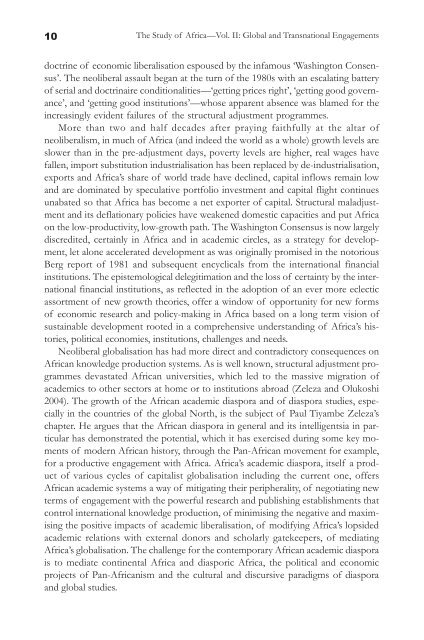The Study of Africa - African Books Collective
The Study of Africa - African Books Collective
The Study of Africa - African Books Collective
Create successful ePaper yourself
Turn your PDF publications into a flip-book with our unique Google optimized e-Paper software.
10<br />
<strong>The</strong> <strong>Study</strong> <strong>of</strong> <strong>Africa</strong>—Vol. II: Global and Transnational Engagements<br />
doctrine <strong>of</strong> economic liberalisation espoused by the infamous ‘Washington Consensus’.<br />
<strong>The</strong> neoliberal assault began at the turn <strong>of</strong> the 1980s with an escalating battery<br />
<strong>of</strong> serial and doctrinaire conditionalities—‘getting prices right’, ‘getting good governance’,<br />
and ‘getting good institutions’—whose apparent absence was blamed for the<br />
increasingly evident failures <strong>of</strong> the structural adjustment programmes.<br />
More than two and half decades after praying faithfully at the altar <strong>of</strong><br />
neoliberalism, in much <strong>of</strong> <strong>Africa</strong> (and indeed the world as a whole) growth levels are<br />
slower than in the pre-adjustment days, poverty levels are higher, real wages have<br />
fallen, import substitution industrialisation has been replaced by de-industrialisation,<br />
exports and <strong>Africa</strong>’s share <strong>of</strong> world trade have declined, capital inflows remain low<br />
and are dominated by speculative portfolio investment and capital flight continues<br />
unabated so that <strong>Africa</strong> has become a net exporter <strong>of</strong> capital. Structural maladjustment<br />
and its deflationary policies have weakened domestic capacities and put <strong>Africa</strong><br />
on the low-productivity, low-growth path. <strong>The</strong> Washington Consensus is now largely<br />
discredited, certainly in <strong>Africa</strong> and in academic circles, as a strategy for development,<br />
let alone accelerated development as was originally promised in the notorious<br />
Berg report <strong>of</strong> 1981 and subsequent encyclicals from the international financial<br />
institutions. <strong>The</strong> epistemological delegitimation and the loss <strong>of</strong> certainty by the international<br />
financial institutions, as reflected in the adoption <strong>of</strong> an ever more eclectic<br />
assortment <strong>of</strong> new growth theories, <strong>of</strong>fer a window <strong>of</strong> opportunity for new forms<br />
<strong>of</strong> economic research and policy-making in <strong>Africa</strong> based on a long term vision <strong>of</strong><br />
sustainable development rooted in a comprehensive understanding <strong>of</strong> <strong>Africa</strong>’s histories,<br />
political economies, institutions, challenges and needs.<br />
Neoliberal globalisation has had more direct and contradictory consequences on<br />
<strong>Africa</strong>n knowledge production systems. As is well known, structural adjustment programmes<br />
devastated <strong>Africa</strong>n universities, which led to the massive migration <strong>of</strong><br />
academics to other sectors at home or to institutions abroad (Zeleza and Olukoshi<br />
2004). <strong>The</strong> growth <strong>of</strong> the <strong>Africa</strong>n academic diaspora and <strong>of</strong> diaspora studies, especially<br />
in the countries <strong>of</strong> the global North, is the subject <strong>of</strong> Paul Tiyambe Zeleza’s<br />
chapter. He argues that the <strong>Africa</strong>n diaspora in general and its intelligentsia in particular<br />
has demonstrated the potential, which it has exercised during some key moments<br />
<strong>of</strong> modern <strong>Africa</strong>n history, through the Pan-<strong>Africa</strong>n movement for example,<br />
for a productive engagement with <strong>Africa</strong>. <strong>Africa</strong>’s academic diaspora, itself a product<br />
<strong>of</strong> various cycles <strong>of</strong> capitalist globalisation including the current one, <strong>of</strong>fers<br />
<strong>Africa</strong>n academic systems a way <strong>of</strong> mitigating their peripherality, <strong>of</strong> negotiating new<br />
terms <strong>of</strong> engagement with the powerful research and publishing establishments that<br />
control international knowledge production, <strong>of</strong> minimising the negative and maximising<br />
the positive impacts <strong>of</strong> academic liberalisation, <strong>of</strong> modifying <strong>Africa</strong>’s lopsided<br />
academic relations with external donors and scholarly gatekeepers, <strong>of</strong> mediating<br />
<strong>Africa</strong>’s globalisation. <strong>The</strong> challenge for the contemporary <strong>Africa</strong>n academic diaspora<br />
is to mediate continental <strong>Africa</strong> and diasporic <strong>Africa</strong>, the political and economic<br />
projects <strong>of</strong> Pan-<strong>Africa</strong>nism and the cultural and discursive paradigms <strong>of</strong> diaspora<br />
and global studies.


